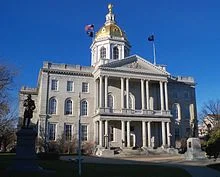
Parasite state
Terminal of Manchester-Boston Regional Airport, whose name is aimed at grabbing Greater Boston business.
— Photo by MaxVT
“As part of the regional metro-Boston area, southern New Hampshire offers all the benefits typically associated with major metro areas yet maintains the advantages of being in a truly enterprise-friendly state: access to a world-class workforce, a pro-business, low-tax environment, and a streamlined regulatory environment.’’
— New Hampshire Gov. Chris Sununu
Women and GOP governors
Rhode Island Gov. Gina Raimondo
From Robert Whitcomb’s “Digital Diary,’’ in GoLocal24.com
A recent poll showed that four of the 10 most unpopular governors are women, with Ms. Raimondo (who is very charming in person) the most disliked. How much of this is sexism, which played a role in Hillary Clinton’s loss in 2016, with its rhetoric of “that bitch,’’ etc.? Meanwhile, the two most popular governors are Massachusetts’s Charlie Baker and Maryland’s Larry Hogan, both Republicans in liberal states and known for their competence and integrity – all of which means that, unlike 50 years ago, they would not be qualified now to be GOP presidential candidates. Besides Mr. Baker, New England has two other very able GOP governors – Vermont’s Phil Scott (whom I’ve met) and New Hampshire’s Chris Sununu.
Many of the Republicans in Congress don’t actually do anything substantive (such as crafting legislation). They spend much of their time going on the likes of Fox “News’’ and denouncing such cooked up bogus ogres as the “Deep State’’ (meaning patriotic and often physically brave government officials, including diplomats, CIA officials and military officers, who might push back against the treason and other corruption of the Trump mob). And of course, as with most of their Democratic colleagues, they spend much of their time raising money from, and trying to please, their big donors – an activity that has intensified with the treasure trove of political money unleashed by the Citizens United Supreme Court ruling, in 2010 – one of the greatest producers of political corruption in American history.
But governors, for their part, have to actually govern in a real, fact-based world. The Republican Party on Capitol Hill is a cesspool of corruption. If there is a future for thoughtful center-right Republicanism it must come from the governors.
Confident Sununu running for re-election as N.H. governor
The New England Council (newenglandcouncil.com) sent this along from New Hampshire Public Radio:
"During a wide-ranging speech in Bedford Wednesday morning, Governor Chris Sununu touched on Washington politics, President Trump, health care, millennials, and, almost as an afterthought, confirmed he’s running for re-election in 2018.
"With no script in hand, Sununu addressed several dozen members of The New England Council, a regional business group, from inside the wood-framed Bedford Village Inn. While the crowd worked on a breakfast of scrambled eggs and orange juice, Sununu worked to come across as a capable leader, a pro-growth Republican, and to carry out his perhaps most favored role: that of cheerleader for all things New Hampshire.
"And with a 62% approval rating and GOP majorities in the statehouse, there was also Sununu, the confident politician.
"'I’m running for Governor again…I love my job, I think we are doing great things. And I feel very confident that we are going to be here in a couple of years and I’ll be giving another boring speech a couple of years from now,' he said to laughs. "But at the same time, I tell my team, put your head down, assume nothing. Get everything done you can, as fast as you can, because that’s what people expect of us: to do our job.'''
To read the whole piece from New Hampshire Public Radio, please hit this link.
Carolyn Morwick: GOP infighting in N.H. legislature's budget battles
The New Hampshire State House, built in 1816-19. Public-building architects in the 19th Century loved golden tops.
From The New England Journal of Higher Education, a unit of The New England Board of Higher Education (nebhe.org):
New Hampshire lawmakers ended hard-fought budget deliberations on June 22 and passed a two-year $17.7 billion budget along party lines. During House budget deliberations, Republicans faced opposition in their own party coming from the newly formed Freedom Caucus. The result was the Republican-dominated House failed to produce a budget, which hadn’t happened in several decades.
The Republican House and Senate eventually overcame the objections of conservative factions, including the House Republican Alliance and the Freedom Caucus. The final budget represents an increase in overall spending of 4.1% with cuts in the business tax, elimination of the electricity consumption tax and new mobile scratch tickets, all of which Republicans say will balance the budget.
The budget:
Cuts the business profits tax from 8.2% to 7.5% for business with more than $50,000 in receipts
Cuts the business enterprise tax which is applied to wages, interest and dividends, lowering the rate from 0.72% to 0.5 %
Adds $100 million to the state’s Rainy Day Fund
Invests in mental-health and child-protection services, including $22.6 million and 60 new beds for community treatment options, and creates a fourth rapid response mobile crisis unit to divert hospitalizations for mental health issues.
Eliminates the Department of Resources and Economic Development (DRED) and creates two separate agencies; the Department of Natural and Cultural Resources, which will oversee two divisions; Parks and Recreation and Forests and Lands, and, the Department of Business and Economic Affairs, which will oversee the current Economic Development and Travel and Tourism Divisions
Creates the first youth drug treatment center in New Hampshire; doubles the Alcohol Fund, adding $7 million for treatment and recovery services over the next two years; and establishes a $4.5 million drug-interdiction program to bring together federal, state and local resources to disrupt the supply chain that brings drugs into the state
Increases funding by $57 million for the developmentally disabled community to reduce the wait list for services
Increases funding for roads, bridges and school buildings
Increases state aid to cities and towns
Increases funding for charter schools by $15 million.
The budget provides no funding for full-day kindergarten, which has been a priority of Gov. Chris Sununu. However, a Republican-backed bill, SB 191, passed and was signed by the governor to fund full-day kindergarten with proceeds from Keno. Cities and towns must decide on whether to allow Keno.
Legislation Signed Into Law
Marijuana, Penalties
HB 640 An Act Relative to the Penalties for Possession of Marijuana
Reduces the penalties for possession of one ounce or less of marijuana-infused products by a person age 21 or older from a misdemeanor to a violation. Violators will receive a $100 fine for the first and second offenses instead of a year in prison and a $2,000 fine for a third offense.
Guns
SB 12 An Act Repealing the Licensing Requirement for Carrying a Concealed Pistol or Revolver
Increases the length of time that a license is valid to carry a pistol or revolver. Allows a person to carry a loaded, concealed pistol or revolver without a license unless such person is otherwise prohibited by New Hampshire statute; requires the director of the division of state police to negotiate and enter into agreements with other jurisdictions to recognize in those jurisdictions the validity of the license to carry issued in this state; and repeals the requirement to obtain a license to carry a concealed pistol or revolver.
Voting, Principal Residence
SB 3 An Act Relative to Domicile for Purposes of Voting
In order to vote, someone would have to prove that the address they are providing as a domicile is “the principal or primary home ... in which habitation is fixed and to which a person, whenever he or she is temporarily absent, has the intention of returning after a departure or absence.”
Legislation That Failed
Children’s Savings Accounts
SB 193 An Act Establishing Education Freedom Savings Accounts for Students
Establishes education freedom savings accounts from the Department of Education for children ages 5 to 20. The program allows the parent of an eligible child to contract and receive a grant from a scholarship organization to pay for qualified educational expenses.
Union, Collective Bargaining
SB 11 An Act Prohibiting Collective Bargaining Agreements That Require Employees to Join or Contribute to a Union
Prohibits collective-bargaining agreements that require employees to join or contribute to a labor union. No person shall be required, as a condition of employment, to resign or refrain from membership in a labor organization, or become or remain a member of a labor organization or pay dues, fees, assessments or other charges to a labor organization.
Common Core Standards
HB 207 An Act Prohibiting the Implementation of Common Core in Public Elementary and Secondary Schools
Prohibits the department of education and the state board of education from requiring any school or school district to implement the common core standards
K-12 Education Funding
The fiscal 2018 budget provides additional per-pupil aid to charter public schools of $625 per pupil; provides $45 million in special education aid; $14.8 million in career and technical education tuition and transportation aid; establishes the dual- and concurrent-enrollment program, which will provide up to $250 per STEM-related course at a public schools for robotics teams.
The budget includes $10 million in new student scholarship programs over the next two years, and provides grants to schools that encourage student engagement in the STEM science, technology, engineering and math) fields. The budget upgrades and rehabilitates the Plymouth and Rochester Career Technical Schools to provide workforce-ready students by age 18.
Higher Education Funding, Tuition
The University System of New Hampshire was flat-funded at $81 million for each of the two years of the biennium. The budget signed into law also provides for $3 million in capital improvements at Plymouth State University and $10 million for the Governor’s Scholarship Program.
USNH Chancellor Todd Leach in his budget request to the governor sought $88.5 million for fiscal years 2018 and 2019, which represents a 12.5% increase over the two-year cycle. In return, Leach offered to freeze in-state tuition for two years and offer free tuition for all valedictorians and salutatorian graduates from New Hampshire high schools who apply to a USNH institution.
The Community College System of New Hampshire faired better in the budget with an increase in funding for the system of $6 million or an overall increase of 7% in the two-year budget. An additional $10 million was included for the system’s capital budget.
Carolyn Morwick directs government and community relations at NEBHE and is former director of the Caucus of New England State Legislatures.



